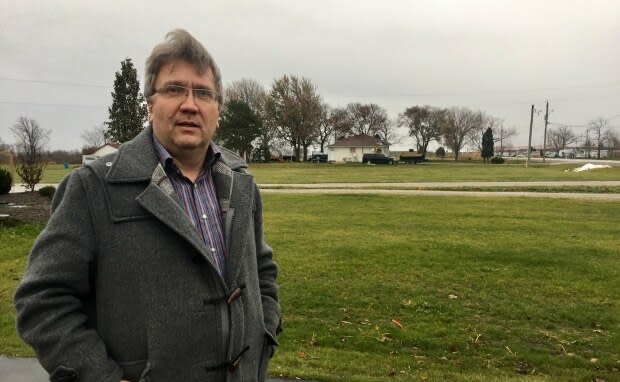'Decision is final': LPAT approves cemetery on former Hydeaway golf course
More than a year after residents first spoke out against it and the project was denied by the Town of Lakeshore councillors, the former Hydeaway Golf Club will become a cemetery.
The Roman Catholic Diocese of London appealed the decision in front of the Ontario Local Planning Appeal Tribunal (LPAT), and in October, a green light was granted to develop the 143-acre property located at 494/496 Elmstead Road in the community of Maidstone.
"We're thrilled," said Pat Simone, the general manager of Roman Catholic cemeteries in the western region for the Diocese.
"That serves the Catholic population — and not just Catholics because we serve all faiths — but that will provide the longevity to the citizens in this area. So we're talking a 100-year plan. It'll be long after any of us are here."
Simone said the cemetery — which won't be fully operational for at least another decade — is necessary because the Diocese expects to run out of space at its other cemetery locations within the next 10 years.
'We objected,' says resident
However, the decision doesn't sit well with some residents.
When the issue first went before Lakeshore council in 2018, a handful of residents, including Alex Golovenko, spoke against building a cemetery in their backyard.
"We objected to that immediately," said Golovenko.

"Our main concern was the decrease in property values because people are superstitious. [It] depends on the culture — there may be people who don't want to purchase next to the cemetery."
He said it would be one thing to build a sub-development around an existing cemetery, but added that it's unfair to build a cemetery in an already established neighbourhood.
Golovenko went on to say that some of his neighbours' families have been in the neighbourhood for generations with "emotional ties" to the place, adding that this change is especially difficult for them.
LPAT received comments from residents
According to court documents, four residents also spoke against the cemetery during the LPAT proceedings, citing traffic, daily reminders of death, grief and sadness, as well as a potential reduction in property value and increased noise as some concerns.
The tribunal also heard from an expert land-use planner to provide opinion evidence in support of the cemetery proposal.
In its decision, the Tribunal said it understands the concerns of residents, but determined there is "no substantiating evidence of undue adverse view, noise or traffic impacts" as a result of the cemetery development.
"And, the subjective views regarding loss of property value and personal dislike of cemeteries are not grounds upon which the Tribunal can refuse the requested approvals," the Tribunal said in its decision, also noting that the cemetery is a necessary public service.
Lakeshore Mayor Tom Bain said the cemetery is essentially a done deal, now that LPAT has had its say.
"The LPAT decision is final," he said.
"Now it's just a matter of getting smaller things corrected so that there is noise mitigation and sight lines are corrected and things like that," he said, explaining that these issues will come up throughout the site-planning process.
Residents are still welcome to bring forward their concerns, though Bain said "the appeal period is gone."
'We want to be... good neighbours'
Simone said the Diocese is committed to working with residents. She said she invites residents to reach out to her so they can walk through the area and talk through the plans with her, adding that she's open to ideas and suggestions.
"We want to be, obviously, good neighbours and respectful neighbours," she said.
"It will be very beautiful as our cemeteries are, and respectful, quiet places, and places where the neighbourhood and the community can come in and wander and look around and enjoy the nature that we will be maintaining."

But Golovenko remains skeptical, and wonders how the development will affect him when he decides to sell his home in the coming years.
"Sure, you could prevent visual or even acoustic noise. But the superstition that people have ... People come from different religious backgrounds that have different attitudes toward burial places," he said.
"Where some cultures may be okay with being next to a cemetery, others may even enjoy it, some may be very concerned, and so that makes the market's value is really dicey."
Simone said the next step in the process is to start some landscaping work in the spring. Over the next year, the Diocese plans on putting together their site plan for the land.
Simone said the Diocese is still about another year away from taking its plan to council, and another 10 years away from officially opening the cemetery.


